International Activities
Exchange with Deutsches Studierendenwerk (DSW) in 2023: Fostering Collaborative Partnerships
TABLE OF CONTENTS
Overview
The biannual study visit of the National Federation of University Co-operative Associations (NFUCA) to Germany transitioned online due to the pandemic. Fortunately, in 2023, we successfully resumed face-to-face exchanges. This visit encompasses training at STW Frankfurt am Main and active participation in the 2023 European Student Assistance Conference (ESAC 2023) in Neustadt.
STWs, known as “Studierendenwerk,” are public student service agencies in Germany that have been providing a range of services, including housing, meals, scholarships, day care, and cultural events, to over 2.8 million students for more than 200 years.
ESAC 2023, organized by DSW as the core institution, convened a conference uniting student service support organizations from across Europe. The discussions at the conference delved into the future of students, universities, and student support services amidst significant changes brought about by pandemics, the Ukrainian conflict, and climate change.
Itinerary
Monday, July 3, 2023
- Arrival in Germany
- Welcome dinner (NFUCA, DSW, STW)
Tuesday, July 4, 2023: Visit to STW Frankfurt am Main (Goethe University Frankfurt)
- Welcome Speech, Introduction of STW
- State of Higher Education and Student Services in Germany: Report by Sven Engel, Director of International Relations, DSW
- STW’s Organizational Structure, Operations, and Funding: Report by Johannes Tiebel, Deputy Director of STW Frankfurt am Main
- Psychological Counseling: Report by the STW Team
- Lunch at Mensa (student cafeteria) “Cafeteria Hoagascht”
- Campus tour: STW’s services
- Tour of the Goethe University Frankfurt Campus Westend, with a focus on the student cafeteria (Gudrun Hartmann, Director of Dining Services at STW Frankfurt am Main)
- Transfer to the venue of ESAC 2023 (Neustadt)
Wednesday, July 5, 2023: 2023 European Student Affairs Conference (ESAC 2023)
- Participation in ESAC 2023
Thursday, July 6, 2023: 2023 European Student Affairs Conference (ESAC 2023)
- Participation in ESAC 2023
- Report from NFUCA: “Universities in Japan and the Role of University Co-operatives: Outline, Education System and Student Support”
Friday, July 7, 2023: 2023 European Student Affairs Conference (ESAC 2023)
- Participation in ESAC 2023
- Return to Japan (Arrival on July, 8)
Visiting STW Frankfurt am Main
STW Frankfurt am Main is a relatively large STW in Germany.
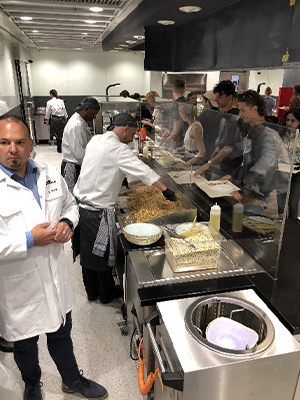
Teppan-inspired iron griddles
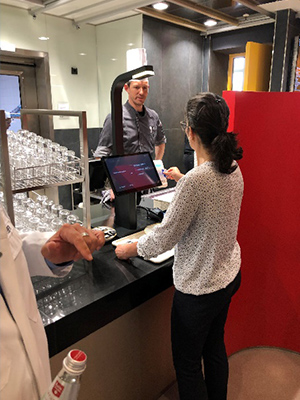
Seamless transactions with image recognition cash register
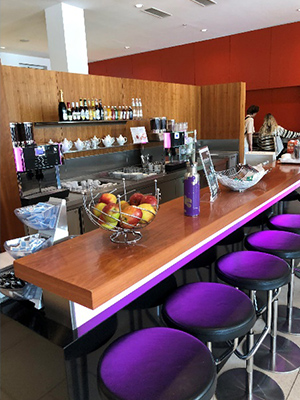
Evening bar counter for an enhanced dining experience
Services
- Cafeteria
- 32 vibrant cafeterias and cafes offering affordable, diverse, and healthy meals from breakfast to dinner. The offerings align with current trends, embracing options like vegan, local food, sustainability, and fair trade.
- Student Dormitories
- 34 student residences featuring 3,749 rooms with rents ranging from 290 to 650 euros. There are communal spaces for music, sports, and social activities, accompanied by the presence of international tutors.
- Government Scholarship Program
- A robust program with approximately 12,000 applications received in FY2022.
- Counseling and Social Services
Meeting growing needs exacerbated by the pandemic, the services include:- Guidance on securing financial aid, including scholarships and loans.
- Legal counseling services.
- Dedicated support for students with children, encompassing childcare facilities and financial services.
- Support for international students.
- Individual counseling and group services for psychological and social well-being.
- STW Frankfurt am Main is engaged in business activities across six universities in the Frankfurt-Main area, catering to approximately 73,000 students.
- Revenue distribution for FY2022: 53% from business sales, 30% from government subsidies, 12% from student contributions, and 5% from other sources. Notably, government subsidies, which had been declining before the pandemic, are now on the rise once again post-pandemic.
Participating in ESAC 2023
Navigating Crisis and Evolving Business Strategies Post-Pandemic
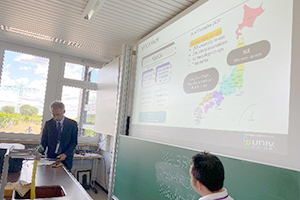
Presentation by NFUCA
- In 2021 and 2022, our online exchanges with DSW in Germany during the pandemic revealed a shared experience of declining face-to-face lectures and limited contact opportunities, mirroring the situation in Japan. Notably, Germany is experiencing a slower recovery in face-to-face lectures compared to Japan, with online lectures becoming more prevalent.
- Adding to these challenges, the 2022 Russia-Ukraine conflict has cast a broader impact on Europe, particularly those connected by land. The German population is grappling with prolonged energy price hikes and inflation, significantly affecting student life.
- These overarching issues set the stage for the main theme of ESAC 2023, where the focus was on how DSW and other national student support services are navigating and addressing the complexities of this difficult situation.
Adapting to this new landscape demands proactive measures for positive change and strategic management in student aid. This entails the formulation of novel concepts, scenarios, and strategic change management for essential services such as student housing, dining, counseling, and mental health. A strategic shift in management is imperative to reshape the social infrastructure of higher education for a resilient future.
(Excerpt from the ESAC203 Conference Guidelines)
Strategies for Tackling These Issues
- Regrettably, no reform guidelines are currently in place. Nonetheless, ESAC 2023 showcased exemplary student support services, predominantly from European nations, encouraging the extraction of insights and lessons from the following instances:
- Management Reforms: Addressing challenges through visionary approaches, understanding, clarity, and proactive measures, including human resource management reforms (STW Darmstadt).
- Student-Centered Perspective: Recognizing the necessity of a student-centric approach for effective student services (University of Antwerp).
- Innovative Communication: Embracing new communication methods through social networks (National Association of Students in Italy).
- Housing Program Response: Effectively responding to the federal government's Housing for Youth program (STW Bonn).
- Lessons from the 1 Euro Cafeteria Initiative: Drawing insights from the successful 1 Euro Cafeteria initiative (CROUS, France).
- Sustainable Food Solutions: Meeting the demands of today's resource-limited yet environmentally conscious students through innovative food responses (Cardiff University).
Adapting Student Support Services to Pandemic Realities
- Amidst the challenges posed by the pandemic, European student support organizations have undertaken a thoughtful approach to the transformation of student support services, aligning them with the actual living conditions of students. Notably, DSW, among others, conducts regular student surveys, and insights gleaned from a survey spanning May to September 2021 illuminated prevailing trends:
- A staggering one-third of students grapple with unstable financial situations, indicating a concerning financial polarization.
- The burden of student rents continues to escalate.
- Health disorders, particularly mental disorders, are on the rise.
- These emerging trends have prompted the presentation of numerous university case studies at ESAC 2023, featuring insights from European countries like Germany, Belgium, and Ireland. Notably, these studies emphasize keywords such as “mental health,” “wellbeing,” and “psychosocial counseling.”
- In Europe, student support services are predominantly subsidized by the government. Consequently, services like Studierendenwerk (STWs) encompass counseling functions and employ counselors, a distinction from the situation in Japan. Despite these variances, the shared focus on addressing students' mental health challenges post-pandemic is evident. The impression is that universities and university co-ops equipped with counseling functions are better positioned to collaborate, offering more comprehensive support to alleviate the burdens faced by students.
Conclusions
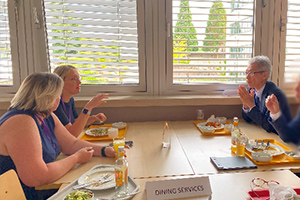
- The global pandemic has wrought significant changes to campus life worldwide, profoundly impacting student support services. Amidst the challenges, our face-to-face interactions revealed a shared commitment to revitalizing university co-ops in Japan. Interestingly, a parallel recognition of the need for management reform in traditional student support services is underway in Europe. This visit served as a poignant reminder that, despite the difficulties, everyone is striving to do their best.
- While acknowledging the distinct differences in the relationship between student support services and higher education policies in Europe compared to Japan, it is evident that both regions are grappling with unique challenges. The varied policies in Europe underscore the importance of tailoring approaches to local contexts. Notably, our observations highlighted how organizations like DSW are meticulously assessing student life to deliver essential support services. This experience reinforced the significance of consistently evaluating university co-op services with a focus on enhancing student life.